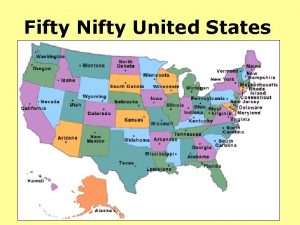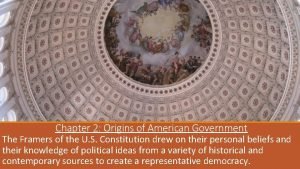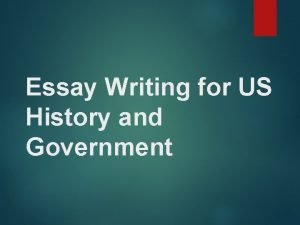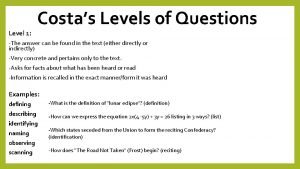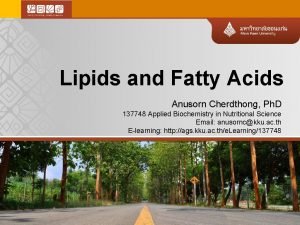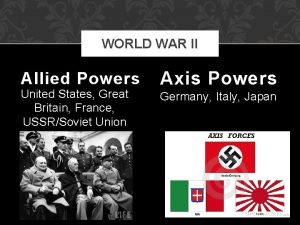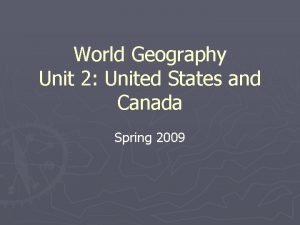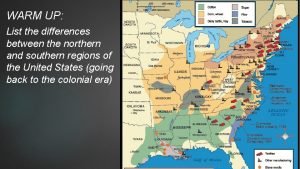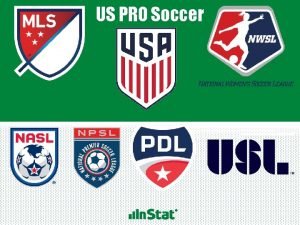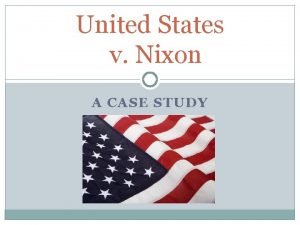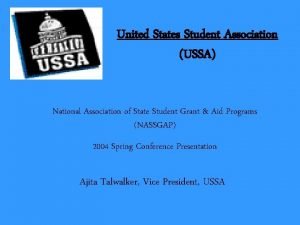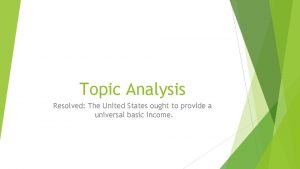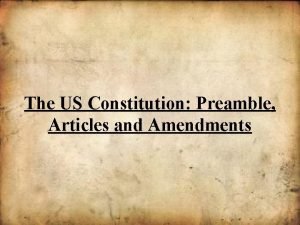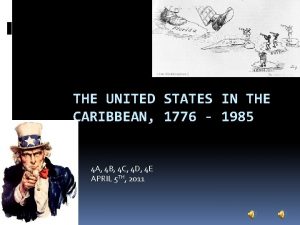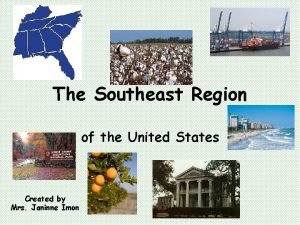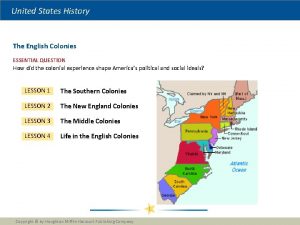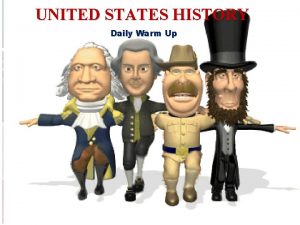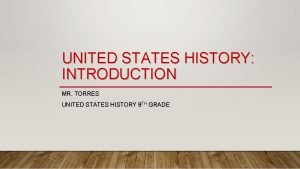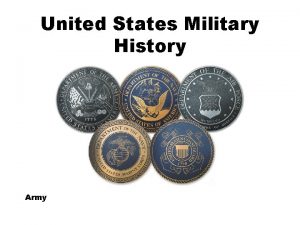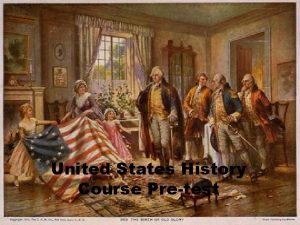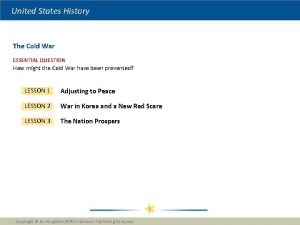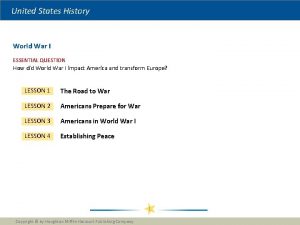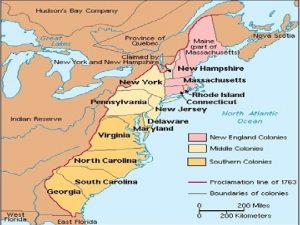United States History The English Colonies ESSENTIAL QUESTION














- Slides: 14

United States History The English Colonies ESSENTIAL QUESTION How did the colonial experience shape America’s political and social ideals? LESSON 1 The Southern Colonies LESSON 2 The New England Colonies LESSON 3 The Middle Colonies LESSON 4 Life in the English Colonies 1 Copyright © by Houghton Mifflin Harcourt Publishing Company

United States History LESSON 2 The New England Colonies Big Idea English colonists traveled to New England to gain religious freedom. Main Ideas • The Pilgrims and Puritans came to America to avoid religious persecution. • Religion and government were closely linked in the New England colonies. • The New England economy was based on trade and farming. • Education was important in the New England colonies. 2 Copyright © by Houghton Mifflin Harcourt Publishing Company

United States History Lesson 2 Pilgrims and Puritans Main Idea 1 The Pilgrims and Puritans came to America to avoid religious persecution. • Puritans wanted to purify, or reform, the Anglican (Protestant) Church. • Pilgrims wanted to separate from Anglican Church. • Some pilgrims left England to escape persecution. They became immigrants, people who leave the country of their birth to live in another country. 3 Copyright © by Houghton Mifflin Harcourt Publishing Company continued…

United States History Lesson 2 Main Idea 1 (continued) The Pilgrims Mayflower Compact • Left Netherlands in 1620 on the Mayflower • Signed the Mayflower Compact: legal contract agreeing to have fair laws (first attempt at self-government in the colonies) • Arrived at Plymouth Rock in present-day Massachusetts in late 1620 Native Americans • Tisquantum, or Squanto, taught Pilgrims to fertilize soil. • Pilgrims celebrated first Thanksgiving with the Wampanoag Native Americans to celebrate the first harvest in Plymouth Colony. 4 Copyright © by Houghton Mifflin Harcourt Publishing Company continued…

United States History Lesson 2 Pilgrims - Main Idea 1 (continued) Pilgrim Community • Most were farmers. Soil was poor so they had to fertilize as learned from the Indians. • Family members worked together. Families served as the center for religious life, health care and community well-being • Men - repaired tools and worked in the fields Women • Women had more legal rights than they did in England. (own property, sign legal contracts, bring cases before legal courts) • Cooked, spun and wove wool, sewing clothing, made soap, cared for livestock 5 Copyright © by Houghton Mifflin Harcourt Publishing Company continued…

United States History Lesson 2 Main Idea 1 (continued) The Puritans • Puritans were dissenters who disagreed with official opinions and church actions in England. • Many thousands left England in the Great Migration from 1629 to 1640. • Puritan colonists led by John Winthrop went to Massachusetts to seek religious freedom and build an ideal Christian community. • Established Massachusetts Bay Colony. They came well prepared (livestock, tools, etc). • Good climate and good relations with the local Indians resulted in few Puritans dying from sickness. 6 Copyright © by Houghton Mifflin Harcourt Publishing Company

United States History Lesson 2 Main Idea 2 Religion and Government in New England Religion and government were closely linked in the New England colonies. • The colonists established a General Court that turned into a type of self -government. Each town sent 2 or 3 representatives. • In 1644 the General Court had a 2 house (bicameral) legislature to make the laws. • Government leaders were also church members. Male church members were the only ones who could vote. • Dissenters (people who publicly disagreed with laws) were forced out of the colony. 7 Copyright © by Houghton Mifflin Harcourt Publishing Company

United States History Lesson 2 – continued Religion and Government in New England Main Idea 2 Religion and government were closely linked in the New England colonies. Religious Conflicts • Thomas Hooker and followers founded Connecticut to make government more democratic. All men (not just members of the church) could vote. Thomas Hooker is often called the "father of American Democracy" • Roger Williams supported the separation of church and state. (Government should have nothing to do with Religion). He was forced to leave Massachusetts. He and his followers moved south and created Rhode Island. 8 Copyright © by Houghton Mifflin Harcourt Publishing Company

United States History Lesson 2 – continued Religion and Government in New England Main Idea 2 Religion and government were closely linked in the New England colonies. Religious Conflicts – continued • Anne Hutchinson questioned teachings of religious leaders and was forced out of the colony. She moved to Rhode Island where government was separated from religion. • In the 1690 s Salem held the largest number of witchcraft trials. Nineteen people were put to death. 9 Copyright © by Houghton Mifflin Harcourt Publishing Company

United States History Module 3, Lesson 2 Religion and Government in New England Main Idea – The Growth of New England colonies caused conflicts with Native Americans Native American Conflict • As colonists spread across New England, they settled where Native Americans already lived and hunted. • Arguments over who owned the land (Native Americans or English) sometimes led to wars between them. 10 Copyright © by Houghton Mifflin Harcourt Publishing Company

United States History Lesson 2 New England Economy Main Idea 3 The New England economy was based on trade and farming. Farming Trade • Harsh climate and rocky soil meant few cash crops. • Most farming families grew crops and raised animals for their own use. (subsistence farming) • Little need for slaves (Some household slaves) 11 Copyright © by Houghton Mifflin Harcourt Publishing Company • Merchants traded goods locally, with other colonies, and overseas. Merchants grew in power and wealth, becoming leading members of the New England colonies.

United States History Lesson 2 New England Economy Main Idea 3 The New England economy was based on trade and farming. Craftspeople Shipbuilding • Skilled trades like blacksmithing, weaving, and printing were in demand. Young boys trained under masters for years to learn trades. Fishing • Fishing was one of region’s leading industries. Dried fish was exported, and whale oil was used for lighting. • Shipbuilding was also an important industry. • Plenty of forrests in NE provided materials for ship builidng • As trade grew there was a greater need for ships to transport cargo. 12 Copyright © by Houghton Mifflin Harcourt Publishing Company

United States History Lesson 2 Education in the Colonies Main Idea 4 Education was important in the New England colonies. Public Education • Communities established town schools. - In 1647, Massachussetts issued and order that there must be a school in every township of 50 families. • Students used New England Primer, which had stories from the Bible. • Availability of schooling varied in the colonies. • Most children stopped education after elementary grades. Many had to go work on their family farm or as a craftsman 13 Copyright © by Houghton Mifflin Harcourt Publishing Company

United States History Lesson 2 Education in the Colonies Main Idea 4 Education was important in the New England colonies. Higher Education • Important to colonists • John Harvard and the General Court founded Harvard College in 1636. • College of William and Mary founded in Virginia in 1693. • By 1700, 70% of men and 45% of women could read and write. This is much higher than in the middle and southern colonies 14 Copyright © by Houghton Mifflin Harcourt Publishing Company
 Fifty nifty united states from 13 original colonies
Fifty nifty united states from 13 original colonies In 1643 four english colonies united as the
In 1643 four english colonies united as the Us history regents essay
Us history regents essay Costa level questions science
Costa level questions science Characteristics of lipids
Characteristics of lipids Was the united states on the axis powers or allied powers?
Was the united states on the axis powers or allied powers? Many _____ people have settled in this megalopolis.
Many _____ people have settled in this megalopolis. Sectionalism map of the united states
Sectionalism map of the united states Nasl
Nasl Marshall case
Marshall case United states student association
United states student association The united states ought to provide a universal basic income
The united states ought to provide a universal basic income Preamble of the constitution
Preamble of the constitution The united states in the caribbean 1776-1985
The united states in the caribbean 1776-1985 Southeast region physical features
Southeast region physical features
